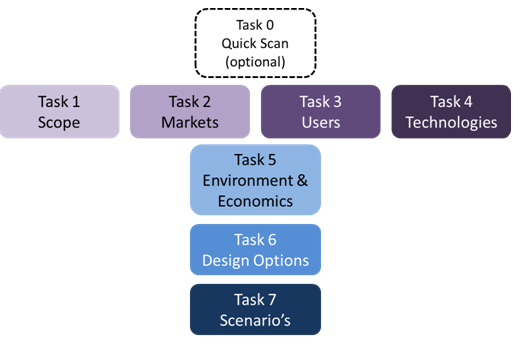Methodology summary
The study will perform the tasks, as set out below:
- Task 1: Verification of existing minimum requirements for Tier 2
- Task 2: Consideration of minimum requirements for single-phase transformers
- Task 3: Verification of existing exemptions and regulatory concessions, with subtasks:
- Task 3.1 - Verification of exemptions in Regulation 548/2014
- Task 3.2 – Analysis of criteria for the repair of transformers in Regulation 548/2014
- Task 3.3 – Verification of concessions for transformers with unusual combinations of winding voltages
- Task 3.4 – Verification of concessions for pole-mounted transformers
- Task 4: Analysis of other environmental impacts
- Task 5: Conclusions and recommendations
- Task 6: Reporting and workshop
The study is not structured according the MEErP methodology. However it will apply, when appropriate, the methodology described in the MEErP. For instance, compared to the preparatory study of 2011 a new 'base case' needs to be added in Task 2. All the tasks of the MEErP methodology (see below) will need to be reprocessed to take into account that the current MEErP methodology has changed compared to the version in place during the preparatory study of 2011. For Task 4 the MEErP tool might not be refined enough and as a consequence a qualitative overview of options will be provided. The conclusions and recommendations in Task 5 will be derived in line with the MEErP process and the Commission’s own requirements as communicated to the study team from the kick-off meeting onwards.
FAQ
What is the MEErP?
The Methodology for Ecodesign of Energy-related Products (MEErP), as established in 2011, was developed to allow evaluating whether and to which extent various energy-related products fulfil certain criteria according to Article 15 and Annex I and/or II of the Ecodesign Directive that make them eligible for implementing measures. This methodology requires the contractor to carry out 7 tasks, ranging from product definition to policy scenario analysis.
The tasks in the MEErP entail:
- Task 1 – Scope (definitions, standards and legislation);
- Task 2 – Markets (volumes and prices);
- Task 3 – Users (product demand side);
- Task 4 – Technologies (product supply side, includes both BAT and BNAT);
- Task 5 – Environment & Economics (Base case LCA & LCC);
- Task 6 – Design options;
- Task 7 – Scenarios (Policy, scenario, impact and sensitivity analysis).
Tasks 1 to 4 can be performed in parallel, whereas 5, 6 and 7 are sequential. Task 0 or a Quick-scan is optional to Task 1 for the case of large or inhomogeneous product groups, where it is recommended to carry out a first product screening. The objective is to re-group or narrow the product scope, as appropriate from an ecodesign point of view, for the subsequent analysis in tasks 2-7.

What are Energy-related products?
Directive 2009/125/EC provides the following definition of energy-related products:
Article 2, item 1: "Energy-related product means any good that has an impact on energy consumption during use, which is placed on the market and/or put into service ...(including parts) ... of which the environmental performance can be assessed independently."
Why should stakeholders be involved?
The European Commission is dedicated in giving stakeholders the opportunity to provide input to this study thereby creating a fully transparent and open process. This website is the main information exchange platform between the study-team, the Commission and the stakeholders.
All (draft) documents will be freely available through this website, but if you register as stakeholder you will receive notifications on website updates. Furthermore, as stakeholder, you can provide direct feedback to draft reports published on this website and make suggestions for energy-related products. Please note that your comments and suggestions may be made public on this website.
When task reports become available, stakeholder meetings will take place. The meeting dates, venues and how to be invited to the meeting will be announced through this website.

